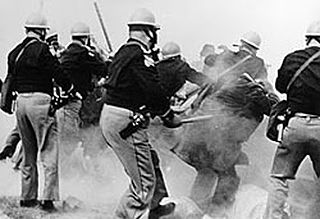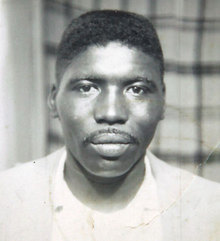
Martin Luther King Jr. was an American Baptist minister and activist who was one of the most prominent leaders in the civil rights movement from 1955 until his assassination in 1968. A Black church leader and a son of early civil rights activist and minister Martin Luther King Sr., King advanced civil rights for people of color in the United States through nonviolence and civil disobedience. Inspired by his Christian beliefs and the nonviolent activism of Mahatma Gandhi, he led targeted, nonviolent resistance against Jim Crow laws and other forms of discrimination in the United States.

The Montgomery bus boycott was a political and social protest campaign against the policy of racial segregation on the public transit system of Montgomery, Alabama. It was a foundational event in the civil rights movement in the United States. The campaign lasted from December 5, 1955—the Monday after Rosa Parks, an African-American woman, was arrested for her refusal to surrender her seat to a white person—to December 20, 1956, when the federal ruling Browder v. Gayle took effect, and led to a United States Supreme Court decision that declared the Alabama and Montgomery laws that segregated buses were unconstitutional.

Ralph David Abernathy Sr. was an American civil rights activist and Baptist minister. He was ordained in the Baptist tradition in 1948. As a leader of the civil rights movement, he was a close friend and mentor of Martin Luther King Jr. He collaborated with King and E. D. Nixon to create the Montgomery Improvement Association, which led to the Montgomery bus boycott, and co-created and was an executive board member of the Southern Christian Leadership Conference (SCLC). He became president of the SCLC following the assassination of King in 1968; he led the Poor People's Campaign in Washington, D.C., as well as other marches and demonstrations for disenfranchised Americans. He also served as an advisory committee member of the Congress on Racial Equality (CORE).

The Southern Christian Leadership Conference (SCLC) is an African-American civil rights organization based in Atlanta, Georgia. SCLC is closely associated with its first president, Martin Luther King Jr., who had a large role in the American civil rights movement.

The Selma to Montgomery marches were three protest marches, held in 1965, along the 54-mile (87 km) highway from Selma, Alabama, to the state capital of Montgomery. The marches were organized by nonviolent activists to demonstrate the desire of African-American citizens to exercise their constitutional right to vote, in defiance of segregationist repression; they were part of a broader voting rights movement underway in Selma and throughout the American South. By highlighting racial injustice, they contributed to passage that year of the Voting Rights Act, a landmark federal achievement of the civil rights movement.

James Joseph Reeb was an American Unitarian Universalist minister, pastor, and activist during the civil rights movement in Washington, D.C. and Boston, Massachusetts. While participating in the Selma to Montgomery marches actions in Selma, Alabama, in 1965, he was murdered by white segregationists, dying of head injuries in the hospital two days after being severely beaten. Three men were tried for Reeb's murder but were acquitted by an all-white jury. His murder remains officially unsolved.

Joseph Echols Lowery was an American minister in the United Methodist Church and leader in the civil rights movement. He founded the Southern Christian Leadership Conference with Martin Luther King Jr. and others, serving as its vice president, later chairman of the board, and from 1977 to 1997 its president. Lowery participated in most of the major activities of the civil rights movement in the 1950s and 1960s, and continued his civil rights work into the 21st century. He was called the "Dean of the Civil Rights Movement."

The Martin Luther King, Jr. Memorial is a national memorial located in West Potomac Park next to the National Mall in Washington, D.C., United States. It covers four acres (1.6 ha) and includes the Stone of Hope, a granite statue of Civil Rights Movement leader Martin Luther King Jr. carved by sculptor Lei Yixin. The inspiration for the memorial design is a line from King's "I Have a Dream" speech: "Out of the mountain of despair, a stone of hope." The memorial opened to the public on August 22, 2011, after more than two decades of planning, fund-raising, and construction.

Jimmie Lee Jackson was an African American civil rights activist in Marion, Alabama, and a deacon in the Baptist church. On February 18, 1965, while unarmed and participating in a peaceful voting rights march in his city, he was beaten by troopers and fatally shot by an Alabama state trooper. Jackson died eight days later in the hospital.

Robert Sylvester Graetz Jr. was a Lutheran clergyman who, as the white pastor of a black congregation in Montgomery, Alabama, openly supported the Montgomery bus boycott, a landmark event of the civil rights movement.

"I Have a Dream" is a public speech that was delivered by American civil rights activist and Baptist minister Martin Luther King Jr. during the March on Washington for Jobs and Freedom on August 28, 1963. In the speech, King called for civil and economic rights and an end to racism in the United States. Delivered to over 250,000 civil rights supporters from the steps of the Lincoln Memorial in Washington, D.C., the speech was one of the most famous moments of the civil rights movement and among the most iconic speeches in American history.

The sermons and speeches of Martin Luther King Jr., comprise an extensive catalog of American writing and oratory – some of which are internationally well-known, while others remain unheralded and await rediscovery.
The Prayer Pilgrimage for Freedom, or Prayer Pilgrimage to Washington, was a 1957 demonstration in Washington, D.C., an early event in the Civil Rights Movement of the 1950s and 1960s. It was the occasion for Martin Luther King Jr.'s Give Us the Ballot speech.
The Alabama Christian Movement for Human Rights (ACMHR) was an American civil rights organization in Birmingham, Alabama, which coordinated boycotts and sponsored federal lawsuits aimed at dismantling segregation in Birmingham and Alabama during the civil rights movement. Fred Shuttlesworth, pastor of Bethel Baptist Church, served as president of the group from its founding in 1956 until 1969. The ACMHR's crowning moment came during the pivotal Birmingham campaign which it coordinated along with the Southern Christian Leadership Conference during the spring of 1963.

The Edmund Pettus Bridge carries U.S. Route 80 Business across the Alabama River in Selma, Alabama. Built in 1940, it is named after Edmund Pettus, a former Confederate brigadier general, U.S. senator, and state-level leader of the Alabama Ku Klux Klan. The bridge is a steel through arch bridge with a central span of 250 feet (76 m). Nine large concrete arches support the bridge and roadway on the east side.
The history of the 1954 to 1968 American civil rights movement has been depicted and documented in film, song, theater, television, and the visual arts. These presentations add to and maintain cultural awareness and understanding of the goals, tactics, and accomplishments of the people who organized and participated in this nonviolent movement.

Frederick Douglas Reese was an American civil rights activist, educator and minister from Selma, Alabama. Known as a member of Selma's "Courageous Eight", Reese was the president of the Dallas County Voters League (DCVL) when it invited the Southern Christian Leadership Conference and Martin Luther King Jr. to Selma to amplify the city's local voting rights campaign. This campaign eventually gave birth to the Selma to Montgomery marches, which later led to the passage of the Voting Rights Act.
This is a timeline of the civil rights movement in the United States, a nonviolent mid-20th century freedom movement to gain legal equality and the enforcement of constitutional rights for people of color. The goals of the movement included securing equal protection under the law, ending legally institutionalized racial discrimination, and gaining equal access to public facilities, education reform, fair housing, and the ability to vote.

On March 7, 2015, President of the United States Barack Obama delivered a speech at Edmund Pettus Bridge to mark the 50th anniversary of the Selma to Montgomery marches on the subject of race relations within the United States. Among the estimated 40,000 present were former President George W. Bush, former First Lady Laura Bush, and Amelia Boynton Robinson, John Lewis, Diane Nash, Bernard Lafayette, and many other 'foot soldiers' who had taken part in the march in 1965.













